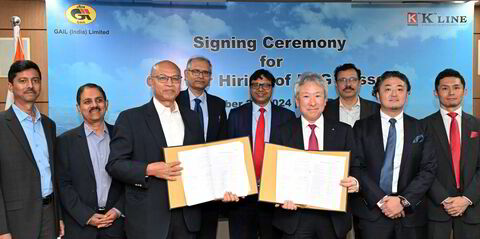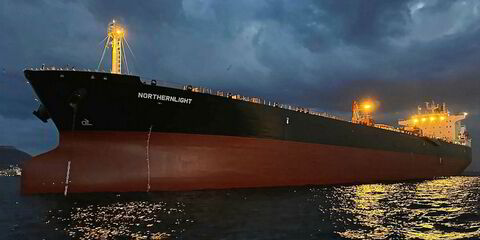Shipbuilders have received invitations to tender for the world’s first ice-breaking LNG carriers.Yards have been asked in the last few days to submit offers for up to 16 LNG vessels of around 170,000-cbm that will be used to ship cargoes from Novatek and Total’s Yamal LNG project in the Russian Arctic sources said. The vessels required are understood to be double acting ice-breaking ships to be built to the Russian Maritime Register’s Arc7 ice-class specifications. The LNG carrier design is said to call for a double wheelhouse, two stacks and five propulsion units among other distinctive features.The Yamal project team appears to be pursuing an ambitious schedule for the vessels and have indicated that they may shortlist shipbuilders in December.There are strict confidentiality terms on the business but one line of talk in the market suggested four South Korean shipbuilders and one Russian yard had been invited to the table.Six yards — Korea’s Hyundai Heavy Industries, Daewoo Shipbuilding & Marine Engineering, Samsung Heavy Industries and STX Offshore & Shipbuilding plus Mitsubishi Heavy Industries and Kawasaki Heavy Industries — were originally pre-qualified for the work.The conceptual design of the vessels, which has been undertaken by Aker Arctic, has taken some time to finalise. The number required remains fluid at present as Yamal has yet to pencil in any supply deals for its planned three-train, 15 million tonnes per annum production project.The partners are targeting sales to buyers in Asia, Europe and possibly South America. Yamal LNG is expected to launch a separate tender for shipowners. A group of pre-qualified owners has already attended a round of clarification meetings in London this summer. Currently, Novatek holds an 80% stake in Yamal LNG with Total claiming the balance.Talks are in progress with Qatar, EDF and another development consortium to join their number.The current partners have said they hope to sanction the project early next year. According to presentations, they plan to identify the yard and owner for the vessels before taking a final investment decision. Start-up of the first train is scheduled for 2016 with the next two to follow in 2017 and 2018.
Latest Jobs
Yamal puts out call for first ice-breaking LNG carriers
Shipbuilders get invitation to bid on novel vessels for Arctic project.
21 September 2012 14:34 GMT
Updated
21 September 2012 14:34 GMT
By


